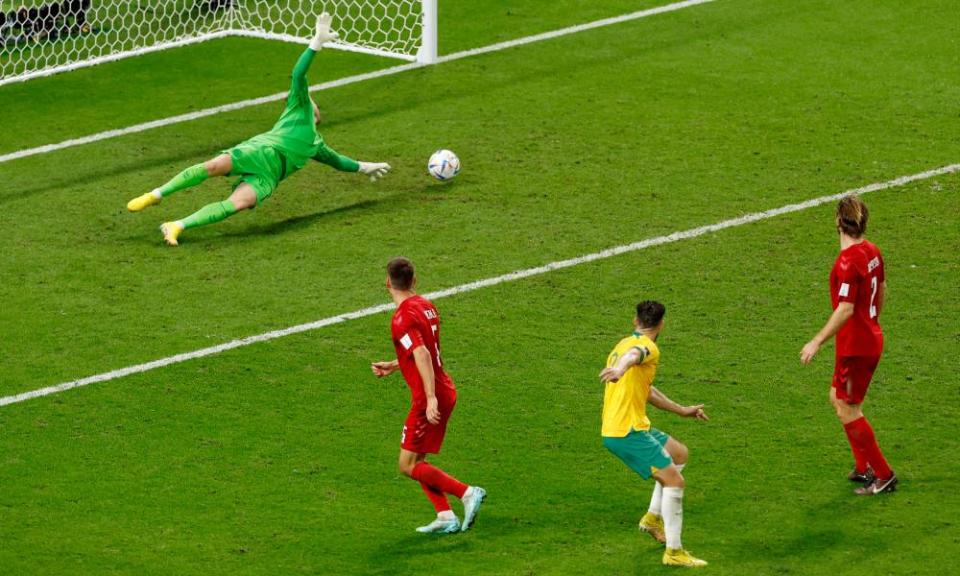‘Now these guys are heroes’: Socceroos bound into last-16 date with Argentina
The Melbourne sky was red with the flares of Federation Square, a heaving party of thousands in the dead of night on a Thursday that exploded in euphoria with the swing of Mathew Leckie’s left boot. In Sydney’s CBD, patrons in a handful of packed pubs spilled out on to George Street as the forward raced off in celebration and then “got slapped in the head about 100 times” by teammates.
For Australia, that goal is immediate sporting folklore. It is the goal that sank Denmark. It is the one that captured those three precious points, the one to seal back-to-back World Cup wins for the first time in the nation’s history, and the one to confirm a place in the round of 16 not achieved in 16 years.
Related: Mat Leckie strike stuns Denmark and sends Australia into World Cup last 16
At full-time the Socceroos bench emptied on to the pitch, drowning out the Danish despair around them, leaping into wild hugs and burying the head coach, Graham Arnold, so far inside the clutch of bodies that Kasper Hjulmand could not immediately locate his counterpart to congratulate him. The winger Martin Boyle, kept in camp despite being ruled out with an anterior cruciate ligament tear, waved his crutches like a maniac.
“Everyone was buzzing, screaming a lot of nonsense,” Leckie said. “So much emotion. But we want to dream big, and when we came to this tournament we always said we want to get out of the group. The first thing Arnie said was: ‘Let’s go one more.’”
Men at Work’s Down Under, and Waltzing Matilda, rang out through Doha. “Give us a public holiday,” read one of the banners in the crowd at Al Janoub Stadium, where thousands of diehards had made what had seemed, before the tournament, a thankless pilgrimage to Qatar to watch an unheralded team do unheralded things.
Australia, ranked 38 by Fifa, had barely squeaked into the draw, qualifying second-last of the 32 teams via a penalty shootout in a playoff against Peru. Some three months before, Arnold had been publicly pilloried and almost sacked. Next to nobody in their own country gave them a chance. Not many back home knew any of their names.
The Socceroos have long languished in the shadow of the 2006 “golden generation”, the class of Mark Viduka and Harry Kewell, Tim Cahill and Mark Schwarzer. They were the last team to make the knockout stages of a World Cup, when Arnold was assistant to Guus Hiddink.

The holy grail has since eluded the country. It is a modest objective by international standards. It had certainly been for the 10th-ranked Denmark. But football sits on the fifth rung of popularity in Australia’s sporting landscape. Its grassroots participation does not convert to professionalism, and there is no money to speak of.
But this group, half of whom have 10 caps or fewer, have been preaching team unity from the start. They come from heritages including South Sudanese, Bosnian, Croatian, Turkish-Cypriot and South African. The Scottish influence is the strongest. They represent modern Australia in the truest sense, and may yet be the catalyst for a long-awaited overhaul of the country’s stunted development pathways.
“We started this journey four and a half years ago,” said Rene Muelensteen, the assistant coach who met Arnold years before that when the latter spent a week at Manchester United while completing his pro licence.
“A lot of credit to Arnie, when we first got together he said: ‘I want to create the greatest Socceroos team ever.’ That message has been the motivation to carry us through that four and a half years, with all the hindrances that we had [qualifying through Asia]. Never mind the distances we have to travel, and only playing four games in Australia. But it has created enormous strength from within.
“We knew from the word go we were going to do something special. We never got carried away by the 4-1 loss to France. Maybe a lot of people dropped their expectations. We knew there was no expectation from outside except from ourselves. Now these guys are heroes.”
Related: Graham Arnold hails Socceroos after team ‘unite the country’ with World Cup run
Kewell, who is now in the commentary box, tweeted: “Over the moon! What an achievement.”
Mark Bosnich, one of Arnold’s biggest critics, posted his “massive congratulations”. He tweeted: “Minor miracle being there, proper miracle now. Superb achievement.”
The prime minister, Anthony Albanese, hailed the “magnificent win”. He will be under pressure to announce that public holiday.
“As a young boy you dream big,” Leckie said. “Watching the Socceroos play World Cups could have, in the back of my head, been the reason I wanted to be a footballer. It’s moments like this that build the game and potentially give young kids inspiration to want to do the same.”

 Yahoo Sport
Yahoo Sport 





































